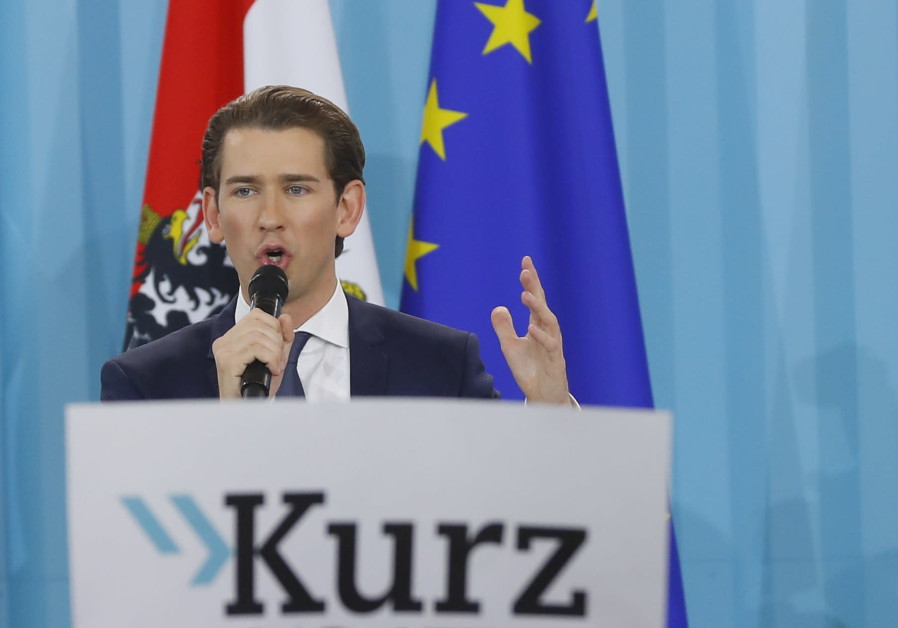Sidestepping standard procedure, Austrian chancellor to visit Western Wall

Top candidate of the People’s Party (OeVP) Sebastian Kurz attends his party’s victory celebration meeting in Vienna, Austria, October 15, 2017. . (photo credit: LEONHARD FOEGER / REUTERS)
Austrian Chancellor Sebastian Kurz is scheduled to go to the Western Wall Sunday afternoon, the first time in recent memory that a leader of an EU country will visit the holy site, even for what is being billed only as a “private visit.”
Kurz, the youthful Austrian chancellor who is in a coalition government with a far-right party anathema to Austria’s Jewish community, arrived for a three-day visit early Sunday morning. He will visit the Western Wall as part of a visit to the Old City that will take him to the Austrian Hospice on the Via Dolorosa — a guest house established by the Austrian Catholic Church in 1854 — and the Church of the Holy Sepulchre.
Israeli diplomatic officials characterized the visit to the Western Wall as “important,” even if it is not a formal one. They noted that while US leaders, beginning last year with US President Donald Trump, now visit the site, it is not on the itinerary for European leaders.
This is Kurz’s first visit to Israel as chancellor, though he has visited three times in the past, including twice as foreign minister.
He is scheduled to meet Prime Minister Benjamin Netanyahu, whom he last met in February at a conference in Munich, on Monday. Kurz will not be going to the Palestinian Authority.
Kurz began his visit Sunday at Yad Vashem, where he laid a wrath in the Hall of Remembrance with Victor Klein, a Holocaust survivor who was in the Mauthausen Concentration Camp that was located in Austria.
“As the Chancellor of Austria I have to state that Austria and the Austrian people carry a heavy burden for their horrific and shameful crimes committed during the Shoah,” he said. “But let me assure you that we Austrians know that we are responsible for our history. It is our duty and obligation to ensure that the Shoah will never happen again, and that my generation and succeeding generations will never forget these horrible crimes.”
Kurz said that for this reason his government decided recently to establish a memorial site in Vienna where “all Jewish victims of the Shoah form Austria will be remembered by name.” Some 50,000 Austrian Jews were killed in the Holocaust.
Conservative Sebastian Kurz’s fresh face may keep Austria’s old conservatives in power, October 13, 2017. (Reuters)
Following the visit to Yad Vashem, Kurz was scheduled to visit the Herzl Museum, lay a wreath at the grave of Shimon Peres, meet Austrian Holocaust survivors, and visit the Hand-in-Hand bilingual school for Jewish and Arab children in Jerusalem. On Monday he is to address the AMerican Jewish Committee’s Global Forum.
Kurz’s visit comes even though Israel refuses to engage with Kurz’s coalition partner, the far-right Freedom Party (FPÖ). Israel’s continued refusal to engage with the FPO is expected to be one of the issues of discussion between Netanyahu and Kurz.
Kurz is accompanied by Education Minister Heinz Fassmann, but not by Foreign Minister Karin Kneissl, who was appointed by the FPÖ.
“Austria has a special historical responsibility never to forget the terrible crimes of the Holocaust and is committed to the security of Israel and its citizens,” Kurz wrote in a twitter post announcing his visit last month. “We actively support Jewish life in our country and fight against any form of antisemitism. Only if Jews can live unreservedly in peace, freedom and security can ‘Never Forget’ become a ‘Never Again.’”
Up until now, Israel has maintained a non-engagement policy with the FPÖ because of its Nazi past – it was founded in 1956 by former Nazis – and the antisemitic and racist leanings of some of its members. In 1999, Israel recalled its ambassador to Vienna for more than three years because the party, then headed by Joerg Haider, joined the governing coalition.
The FPÖ’s current leader, Vice Chancellor Heinz-Christian Strache, has made efforts to distance himself from the antisemitism of his party’s past and put forward strong pro-Israel positions that have been interpreted in Jerusalem as an effort to get Israel’s “stamp of approval,” something that would help him gain legitimacy elsewhere.
Austria’s organized Jewish community adamantly opposes the FPÖ and is against any Israeli engagement with the party.
In March, at a speech marking the 80th anniversary of the Anschluss — when the Nazis rolled their tanks into Austria and were met by adoring, saluting and cheering Austrians — Kurz acknowledged it has taken Austria a long time to be “open and honest” about its past.
Kurz said that Austria’s historical responsibility toward the Jews extends to Israel, a comment never made before by an Austrian chancellors – a group that has included pro-Palestine Liberation Organization Bruno Kreisky and former Nazi Kurt Waldheim.
“We also have a special responsibility to the State of Israel and the security needs of the Jewish people there more than we have practiced in Austria in the past,” Kurz said at the time.





Comments are closed.